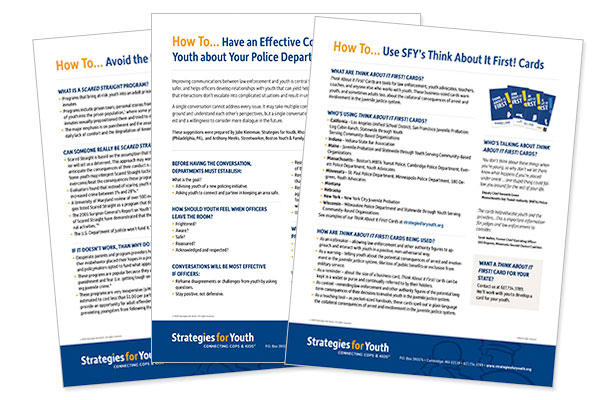
Strategies for Youth created How to … at-a-glance guides in response to questions that officers regularly bring up at our trainings nationwide. The contents of are vetted by experts in the field. They are free for you to download and use.
Best Practice Guides are free. We encourage you to download and share them.
For information about customized Think About It First! Cards for your state:
info@strategiesforyouth.org
or 617.714.3789

Improving communications between law enforcement and youth is central to effective community policing. It keeps officers safer, and helps officers develop relationships with youth that can yield helpful information. Good communication means that interactions don’t escalate into complicated situations and result in unnecessary arrests. This flyer gives detailed guidance about how to prepare for conversations with two very different goals: 1) connecting with youth and seeking their cooperation, 2) laying down the law.

Using handcuffs during arrest and transport is meant to restrain and protect youth, but youth-appropriate procedures should be followed to keep both youth and police safe and to prevent the incident from becoming a liability for departments. This handout discusses when it is not appropriate to use handcuffs on youth and provides guidelines for apply them when it is appropriate.

An ever increasing number of youth are exploited through prostitution and international sex trafficking. In the United States alone, about 300,000 children are at risk of being commercially sexually exploited. The average age of youth entering the sex industry is 13. To help officers recognize signs of sexual exploitation of youth, Strategies for Youth has summarized current information and best practices on how to recognize, interview and interact with sexually exploited youth. At the end of this flyer we provide a list of helpful resources.

Truancy has evolved from Mark Twain’s description in Huckleberry Finn: “a joyous rebellion against authority and responsibility.” Today, truancy of youth under 14 is viewed less as failure by youth to do well in school, and more as a failure by a school to meet a student’s needs. This flyer addresses the common causes of truancy, why police should be concerned about it, and how to approach a situation involving truancy.

Many officers deal with death routinely and are faced with the impossible task of breaking the news to youth that their siblings, cousins, friends, and parents are dead. What’s the best way to do it? Should you be direct? Should you use euphemisms? Strategies for Youth spoke with psychologists, psychiatrists and police trainers from around the country and developed a chart to help officers consider what to say and how to say it depending on the youth’s age.

Think About It First! cards are tools for law enforcement, youth advocates, teachers, coaches, and anyone else who works with youth. This flyer explains how officers can use them as an ice breaker, as a warning, as a reminder, or to provide context for teaching about applicable laws.

Scared Straight programs are based on the assumption that the consequences of illegal behavior will act as a deterrent. This approach may work with adults, but teens’ ability to anticipate the consequences of their conduct is at a low point during adolescence. This flyer reviews why Scared Straight tactics don’t work with teens and provides suggestions of practices that are much more effective.
Please sign up for our newsletter to the latest on Strategies for Youth’s efforts to create safe and thriving communitities for our children.